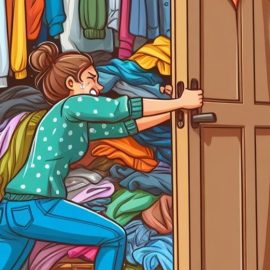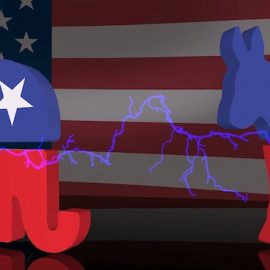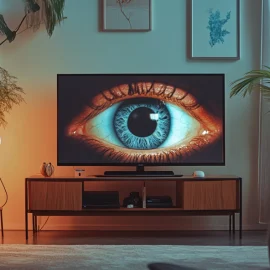

This article gives you a glimpse of what you can learn with Shortform. Shortform has the world’s best guides to 1000+ nonfiction books, plus other resources to help you accelerate your learning.
Want to learn faster and get smarter? Sign up for a free trial here .
Are you ready to make a change in society? What are ways to make the world a better place?
Even with so many advancements that have made lives easier, the world is far from perfect. With climate change getting worse every year and people not getting along, there’s room to make the world a safer and more enjoyable place to live in.
Keep reading to learn the actions you and others can take to make the world a better place.
1. Reduce Carbon Emissions
Every aspect of our way of life—from the food we eat to our energy production to manufacturing—relies heavily on fossil fuels. But burning fossil fuels releases carbon dioxide and other greenhouse gasses that cause climate change. In How the World Really Works, Vaclav Smil says that the primary causes of climate change are:
- Fossil fuel combustion, deforestation, and cement production, which release carbon dioxide
- Cattle, natural gas production, landfills, and rice fields, which release methane, and
- Fertilizers, which release nitrous oxide
Carbon dioxide is responsible for about 75% of global warming, methane for 15%, and nitrous oxide for about 10%. Smil argues that we need to reduce energy use in all areas—transportation, buildings, agriculture, and industry—to cut down on carbon emissions and learn how to make the world a better place. Two primary ways to do so are by generating electricity from renewable sources and by using nuclear energy.
- Generating electricity without relying on fossil fuels is the fastest way to cut down on carbon emissions because solar and wind-powered electricity is now cheaper than other forms. Countries like Germany now generate 40% of their electricity from renewable sources.
- Smil says that burning fossil fuels causes far more deaths from air pollution than nuclear reactors cause. He explains that even when fatalities from Chernobyl and Fukushima are included, nuclear electricity generation is far safer than generating electricity from fossil fuels.
Other Ways to Cut Down on Carbon Emissions From Energy Use
Smil points to a variety of other ways to reduce carbon emissions. For example, he says homes should be required to be well-insulated to keep in heat and reduce carbon emissions. And people shouldn’t drive SUVs—any emissions gains resulting from electric cars have been erased many times over by SUVs.
Additionally, Blowout by Rachel Maddow discusses some possibilities for curbing the negative effects of the energy industry. Namely, by bringing an end to tax breaks for oil and gas companies, requiring more transparency on their dealings with foreign governments, and enforcing stricter government regulation of where, when, and how these companies can drill.
She argues that requiring energy companies to pay higher taxes would mean that their profits would enrich the citizens of the state where drilling takes place, not just the energy executives. More transparency, as enforced by laws that would require companies to report exactly how much money (and for what goods or services) is changing hands, could bring an end to corruption. If ExxonMobil had to report on its dealings with Equatorial Guinea or Russia this extensively, bribes and money laundering would become impossible. Finally, strict government regulation of drilling activity could prevent accidents and environmental disasters.
Some of these changes were made in Oklahoma from 2016-2018, and the positive effects were immediately obvious. Raising taxes meant that the demands of striking teachers for better pay and conditions could be met, and the local government could pay off some of its debts, all without significantly hurting the profitability of the energy industry. Local oil and gas companies have continued to thrive without endangering the lives, property, and environmental resources of Oklahomans.
2. Legalize Psychedelics to “Depattern” Society
How to Change Your Mind by Michael Pollan explains that psychedelics have important social and cultural implications for human society—in the past, present, and future. Psychedelics may have contributed to our cognitive and spiritual evolution and have the potential to make the world a better place.
During Pollan’s research, he found that many experts involved in studying psychedelics have eventually shifted their emphasis from the treatment of individuals to the potential for the treatment of society as a whole. He explains that this is because the benefits of psychedelics may contribute to greater empathy, a deeper sense of connection with others, and a reconnection to nature. On this last point, many argue this could be a key to solving the growing environmental crisis.
Ethnobotanist Giorgio Samorini says that psychedelic experiences disrupt our deeply ingrained patterns of thought and allow us to develop new creative ways of thinking. He calls this “depatterning” and says when societies are in rapid states of change or high-challenge situations, this ability to think in novel ways is crucial for adaptation and survival. So he concludes that psychedelics can be a tool for survival that humans turn to during specific time periods, such as when they’re facing challenges that need out-of-the-box thinking.
Psychedelics Could Help Create a More Just and Equitable World
The anthology Psychedelic Justice: Toward a Diverse and Equitable Psychedelic Culture addresses ways that psychedelics might contribute to a more just and equitable world. Essays in the book suggest that social justice advocates today may be unintentionally creating more division by focusing on so many different issues of inequality as though they were separate phenomena. The complexities involved with many intersecting dimensions of inequality in the 21st century may require a novel approach, and the book argues that psychedelics could offer that.
It hearkens back to the counterculture movement of the 1960s, pointing out that prominent figures in that movement recognized the value of psychedelics as being in the potential to change minds. This reinforces the premise that Pollan has embedded in the title of the book: How to Change Your Mind.
So, the collection of essays in this book suggests that rather than simply trying to fight every systemic issue at the level of policy, we should be confronting the root of the issue: the way people think. And psychedelics could help to change the attitudes that created the systems of inequality in the first place. This could address issues like sexism, patriarchy, homophobia, and binary thinking that harm individuals.
The book argues, overall, that we should be working to integrate psychedelics into society as a whole, and it offers some guidance on how to do that while respecting indigenous communities and mitigating the potential risks and dangers.
3. See Humans as Fundamentally Good
Humankind by Rutger Bregman states that having a more positive outlook on humanity can create positive change in our society. Bregman argues that whichever view of humanity we choose—Hobbes or Rousseau, evil or good—creates a feedback loop. In other words, we get what we expect from people. Research suggests that expectations have a significant impact on behavior. For example, if a parent consistently tells their child that the child is unathletic, then the child will start to believe it. She might avoid playing sports with other children. If she does play, she’ll see every failure as proof that she’s unathletic, instead of as an opportunity to improve. She, therefore, enters a negative feedback loop.
According to Bregman, the same is true of how we see humans. If we expect people to be selfish, they’ll act selfishly. However, the opposite holds as well: If we see humans as fundamentally decent creatures, we’ll treat each other with respect, trust, and dignity, which will encourage others to be kinder and more compassionate in turn. By changing our mindsets, we can create a positive feedback loop that leads to a friendlier and more peaceful world.
Bregman maintains that, while it may sound idealistic, evidence from prisons, corporations, and politics shows that these positive feedback loops help people understand how to make the world a better place. Let’s take a look at the possibilities of a positive mindset.
The Criminal Justice System
According to Bregman, one of the places where our society creates negative feedback loops is prisons. He maintains that seeing prisoners from a Hobbesian perspective—as inherently evil criminals who require strong punishment—actually leads to more crime.
For example, in the United States, prisons are often punishment-based. Prisoners live in overcrowded cells with little to no time for exercise, and they receive punishments like solitary confinement when they break the rules. These strict rules make it harder for ex-convicts to adapt to life outside of prison, which isn’t as structured or punishment-based. Bregman suggests that this contributes to high reoffending rates in the United States.
However, Bregman argues that we can create positive feedback loops in the criminal justice system. In Norway, for example, prisons are reform-centered. Guards rarely carry weapons, and they treat prisoners with respect. In one prison, inmates live in a type of commune, plowing the land and growing their own food. Norway’s recidivism rate—the percentage of prisoners who end up in prison a second time—is significantly lower than that of the United States.
Corporations
According to Bregman, we can also create positive feedback loops in corporations. He suggests that when managers see and treat their workers as lazy and untrustworthy, workers are less intrinsically motivated and creative. For example, bonuses and pay-per-hour systems, which seek to hold “lazy” workers accountable, can make workers so focused on working a certain number of hours or getting paid more money that they no longer care about doing the job well. Instead, Bregman suggests that businesses should minimize bureaucracy and trust their employees to find creative solutions.
Government
Bregman also extends his positive feedback loop theory to civic engagement. Studies show that when city governments give their citizens more power to negotiate and make political decisions, there’s more participation and interest in politics, less polarization, and less corruption. Inequality decreases because citizens of all social classes and groups have a seat at the table.
4. Install a Version of Communitarianism
Michael Sandel has his own conception of justice that he thinks can make the world a better place. In his book Justice, he advocates a version of communitarianism (a philosophy arguing that the goal of the state is to create and preserve a community of citizens) that promotes public engagement, kinship among citizens, and the sense that they’re part of a larger project.
Sandel argues that his version of communitarianism combines the best parts of the philosophies he discusses while avoiding the morally concerning portions:
Utilitarianism: Sandel’s view shares the utilitarian concern for the overall public good by focusing on serving the community as a whole. Unlike utilitarianism, however, Sandel’s philosophy sees individuals as inherently valuable community members regardless of pleasures or pains.
Libertarianism: Similar to libertarians, Sandel appreciates the benefits of the free market as a tool for organizing and creating wealth. He also believes that the state should, to a degree, respect personal freedoms. However, Sandel doesn’t argue for complete deregulation of these areas—instead, he argues that the state should manage and regulate personal conduct and the market to make sure they serve the community as a whole.
Liberalism: Much like liberal philosophers, Sandel argues for a baseline level of decency, respect, and personal rights for all human beings. However, he disagrees with the liberal view that those baseline moral obligations derive only from reason. He argues that people also have moral obligations to their loved ones and communities. Sandel also disagrees with the liberal view that governments should avoid questions of morality—he says people must debate these questions to determine their community’s goals and differences.
Aristotle’s political theory: Sandel agrees that the state should help people live fulfilling and virtuous lives. However, unlike Aristotle, he’s against forcing people into certain roles and distributing social goods based on merit and moral “desert.” Instead, Sandel believes that the state should instill values of kinship, solidarity, and civic participation so everyone can freely debate over the best, most moral way to live and distribute social goods.
5. Donate Clothes and Books
We all have stuff that we hold onto but we can’t get rid of, either for sentimental reasons or because we think we might need it later. The truth of the matter is, there are people out there who could use these items. So it’s time to start donating to make the world a better place.
Two categories of items you should consider donating are clothes and books. The Life-Changing Magic of Tidying Up by Marie Kondo breaks down how to discard any items to give to other people. When organizing clothes, the golden rule to think about is what people need. Practical tennis shoes are a must, along with coats and heavy clothing for the winter. Formal attire is also practical for people who can’t afford clothes for job interviews.
Books are also great to donate for educational purposes. Schools that have limited funding often reuse textbooks and other books for years, even when they’re battered and torn apart. If you’re a student holding onto old textbooks, consider donating them to schools or universities.
Because public libraries are free to use, donate old novels or even cookbooks to them. Anybody can check your old books out and enjoy them.
Wrapping Up
Nobody can make the world a better place on their own. People need to collectively come together as a community to make a brighter future a reality. The next generations will thank us for putting in the effort to make the world a cleaner and more enjoyable place to live in.
What are other ways to learn how to make the world a better place? Let us know your suggestions in the comments below!

Want to fast-track your learning? With Shortform, you’ll gain insights you won't find anywhere else .
Here's what you’ll get when you sign up for Shortform :
- Complicated ideas explained in simple and concise ways
- Smart analysis that connects what you’re reading to other key concepts
- Writing with zero fluff because we know how important your time is






